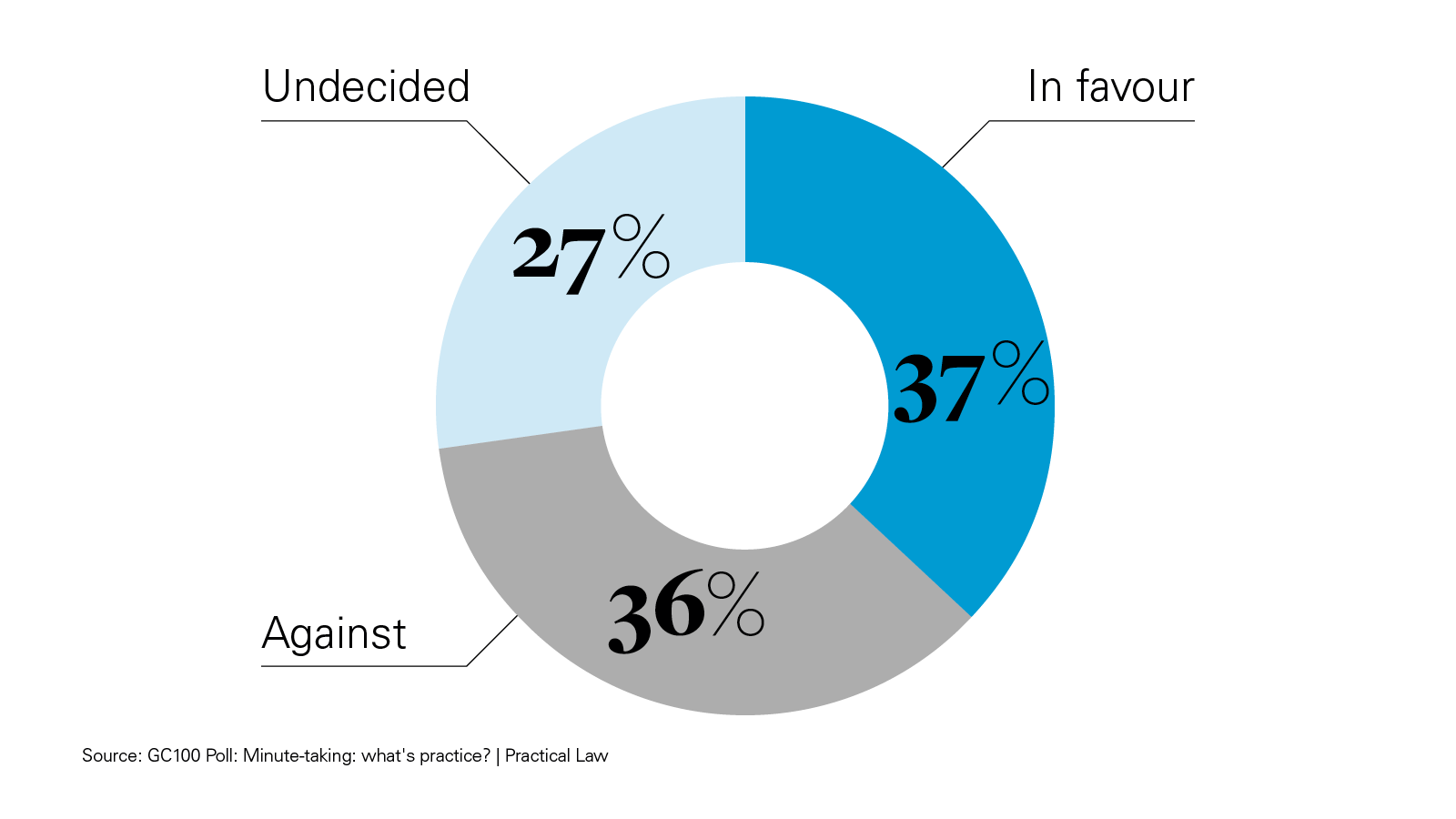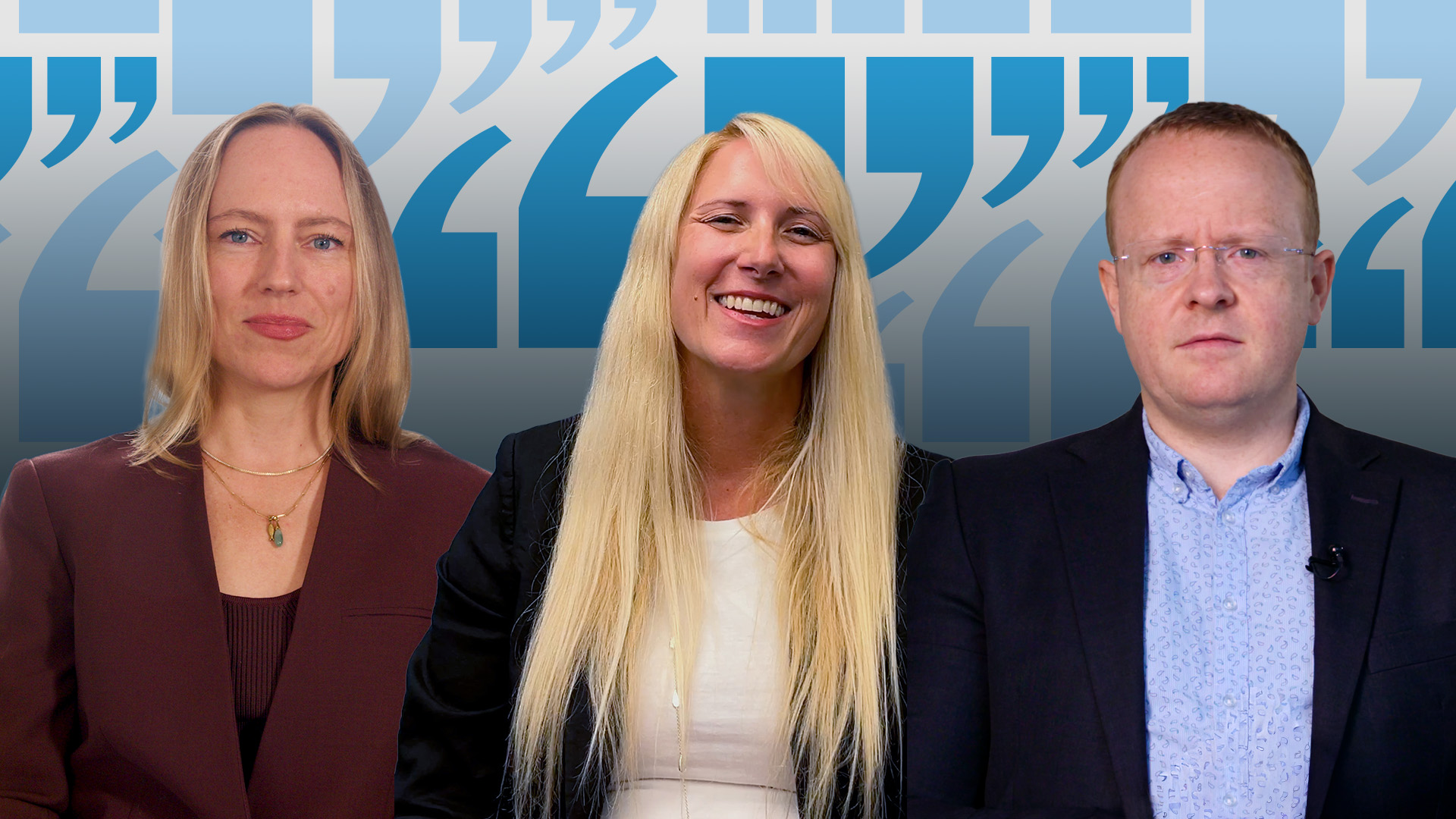
In the context of a growing spotlight on AI, we are fielding increased questions from general counsel and corporate secretaries around how companies can adopt AI within the Boardroom, whilst managing the legal risks associated with it. In this client alert we look at various considerations in respect of the adoption of generative AI note-taking tools, with a particular focus on privilege within the UK Boardroom environment, and have formulated a set of guidelines companies should follow to help mitigate the associated risks.
There are clear benefits to the use of AI in the Boardroom, but unless certain guardrails are put in place and guidance followed, the use of AI designed to create efficiencies and streamline processes can store up issues in the long run which cannot be easily unwound.
Guidelines
- Put in place a policy on the use of AI in drafting Board minutes.
- Ensure all AI output has been subject to human review before being finalised/added to the corporate records.
- Add a disclaimer to drafts of minutes, meeting notes and AI output, making it clear that they are not intended to be the definitive record of a meeting and that they will be superseded in all respects by the final minutes.
- Ask AI product providers how they have designed their products in light of confidentiality and privilege considerations.
- Ensure all meeting participants are made aware that a meeting is being recorded and how AI is being used.
- Ensure you understand how automation is built into an AI product and how it behaves if circumstances change (e.g., if a person is asked to leave part of a meeting, will they automatically be provided with a copy of the minutes for the full meeting?).
- Be aware of all forms in which the data is obtained. When minutes are prepared there will usually be an audio recording as well as a written record.
AI and Corporate Governance
The influence of artificial intelligence (AI) in the corporate world is becoming hard to ignore. No longer just a buzz word, AI is beginning to infiltrate more functions across corporate institutions. The search for AI-generated efficiencies is a question that most organisations are now actively engaging with.
In this context, general counsel and corporate secretarial functions are starting to be faced with the question of whether, and to what extent, AI is to assume a role within the corporate governance function. In particular, we are receiving more enquiries on the use of AI in the Boardroom. The extent to which various forms of AI should be adopted in this context is not simple, given the nature of Board meetings and the importance in this context of trust, open communication, rigorous scrutiny, challenge and confidentiality.
A 2024 poll conducted by GC100 (the representative body of general counsel and company secretaries in the FTSE 100) showed mixed views around the appropriateness of AI in the Boardroom, across a sample of FTSE 250 and large private companies. When asked whether they were in favour of using AI in the Boardroom, mixed responses were received from respondents:
At a time when the use of AI in a Boardroom setting remains at an early stage of development, and opinion from general counsel and corporate secretaries is mixed, it is crucial to consider in the whole both the positive impacts, and inevitable drawbacks, of applying AI in the Boardroom.
How could AI be used in the Boardroom?
AI has already been applied to various uses in a Boardroom setting. A key benefit is AI's ability to produce data-driven analysis on topics such as market trends, customer behaviour and financial information, which in turn helps to promote objective (and minimise subjective) Boardroom views. AI has also been used in the automation of certain Boardroom logistical processes, for example arranging meetings and preparing materials such as Board packs, presentation slides and meeting agendas.
Board meeting notes and minutes
One of the most significant use cases for AI is in the context of note-taking. Generative AI, a type of AI that can produce new content, has enabled the development of various AI note-taking tools that go far beyond simply recording verbatim the content of a meeting. Such tools can assist not only with preparing intelligently formatted and attributed notes of a meeting, but also with summarising key discussion options and tracking actions, whilst identifying different speakers and ensuring style remains aligned with precedent minutes.
Although there are no doubt efficiencies to be gained from AI note-taking, there remains a general hesitance to adopt this form of AI in relation to minute-taking. The 2024 GC100 Poll reported that 92% of respondents had not yet used AI to assist with minute-taking. There are a number of considerations that may be leading to the general reluctance around AI note-taking tools:
- Inaccuracy: Despite significant advancements in the capabilities of generative AI, this form of technology does not come without the risk of inaccurate or incomplete work products. AI may not always be able to match human input in terms of ability to contextualise conversations, apply institutional knowledge, interpret tone and dynamics, and apply judgment to the content of resulting board minutes.
- Full and frank discussions: A key element of Board meetings is open and clear exchange of views, however the recording of meetings with AI and/or audio/video recordings may have the psychological impact of discouraging authentic and honest discussions, due to the knowledge of each word being transcribed and analysed. In the 2024 GC100 Poll, respondents were of the view that many directors would not be comfortable with Board meetings being recorded for AI note-taking purposes.
- Data protection and AI regulation: Any proposed use of AI in Board meetings will require a review of applicable compliance obligations under data protection laws and AI regulatory laws. This will likely include providing transparent information to attendees regarding the ways in which AI will be used, and the impact that those uses may have on the attendees. Applicable trade secret laws will also need to be considered, if discussions relate to information that may be protectable as a trade secret.
- Data breach and unauthorised access: Using generative AI for note-taking in Board meetings, without sufficient safeguards in place, may increase the risk of the relevant meeting minutes (which may be highly sensitive) being accessed beyond the organisation. AI tools can be cloud-based or rely on third-party providers, therefore introducing the risk of data breaches or unauthorised access to the information. Issues may also arise in terms of compliance with the organisation's internal policies or applicable external data security regulations.
- Statutory disclosure: Non-final and non-human reviewed output from AI bots, audio recordings, or automatic file notes may be disclosable under certain legislation (e.g., Freedom of Information requests or as part of Judicial Review proceedings).
- Privilege: Finally, a key concern arising in the context of AI note-taking is the breach of confidentiality and potential waiver of privilege.
Generative AI: Impact on Legal Privilege
In the UK, there are two forms of legal professional privilege, each of which protect certain confidential communications from general disclosure. Of relevance in a wider, non-litigation context is legal advice privilege, which protects confidential communications between a lawyer (including an in-house lawyer) and a client that are made for the sole or dominant purpose of giving or receiving legal advice about what should prudently and sensibly be done in the relevant legal context. Litigation privilege is broader and covers communications between a lawyer and client, or either of them and a third party, that are made for the dominant purpose of litigation (or litigation which is pending or reasonably contemplated).
Privilege can also protect documents (or parts of documents) that reflect or reveal privileged information, for example Board papers. The English courts have held that the communication of privileged advice from its recipient to a company's Board of directors should not cause loss of privilege, nor should oral submissions of advice at a Board meeting.
There are however several pitfalls which can lead to privilege not attaching to documents, or the inadvertent loss of privilege over documents, that Boards, general counsel and corporate secretarial teams should be aware of given the increased use of generative AI tools in the Boardroom.
Where Board papers or minutes attract legal advice privilege, the intention would be for such privilege to be maintained. Legal advice privilege may however be inadvertently lost where confidentiality is lost, so it is important that processes and safeguards are put in place to maintain confidentiality. The question therefore arises as to whether the use of AI note-taking in connection with Board communications, which would otherwise attract privilege, could result in the inadvertent loss of privilege.
As confidentiality is key to maintaining privilege, if a document or communication otherwise subject to such privilege has been disclosed, and such disclosure was not on confidential terms, then both confidentiality and privilege in the document or communication will be lost. Without sufficient limitations in place, certain AI tools may have the effect of jeopardising the confidentiality of any Board communications that they are used in connection with.
This could happen for example where an AI tool automatically circulates notes more widely than the attendees of a Board meeting, or where an AI tool is otherwise not equipped with sufficient safeguards to ensure that there are no dissemination or access rights beyond the individuals in the organisation who objectively need to know the legal advice. Another concern is that the AI tool may grant the vendor wide rights allowing for the data to be used by the vendor or otherwise shared with third parties, on terms that do not expressly protect privilege.
Recommendations
Overall, where AI tools (in particular in their non-enterprise forms) permit circulation of any generated notes to a third party, there is a risk that confidentiality and thus privilege may be lost in the content of the notes. In this context, general counsel and corporate secretarial teams should take care before adopting AI note-taking tools, within their role of safeguarding privileged communications across the organisation. It may also be relevant to consider the privilege rules of various jurisdictions, depending on the location of meeting attendees. Where vendor contracts permit sharing of information with third parties, they should include express terms that privilege is not waived in so doing.
It remains to be seen whether generative AI tools will be able to prepare Board minutes with a view to ensuring that privilege is not lost over legal advice that is discussed at Board level. A Board minute summarising or attaching a copy of legal advice received will be privileged, but if the minute goes on to discuss the advice or its implications, then privilege may be lost. Care needs to be taken in the preparation of minutes to ensure that this does not happen. At present, it remains prudent for such Board minutes to be prepared (or at least checked) by a lawyer before they are finalised and issued for this purpose.
Generative AI: The Importance of Accuracy
Under the Companies Act 2006, companies must keep a record of directors' meetings, and failure to do so can amount to a criminal offence for directors. Internal rules such as articles of association or shareholders' agreements may add further requirements. Since there is little prescription on the form or style of Board minutes, practices vary, but companies must ensure records are accurate and compliant. The use of generative AI to draft or summarise minutes can introduce risks if the technology produces errors, includes irrelevant or formulaic content, or fails to reflect the specific requirements of the company's constitution.
The core purpose of Board minutes is to create an impartial and reliable record of meetings. Minutes not only provide a practical reminder of actions, but also evidence that directors have fulfilled statutory duties, such as declaring and approving conflicts and considering stakeholder interests. If generative AI is used, there is a danger that nuance may be lost, leading to gaps in the legal record or misrepresentation of discussions. As minutes may later be disclosed in litigation, regulatory reviews or due diligence, reliance on AI without robust human review could expose a company to reputational or legal risk. In the transactional context, Board minutes are often prepared in advance and used as an agenda to guide advisors' briefings to the Board; AI has not yet been able to substitute that process and role.
Courts and regulators give most weight to minutes that clearly reflect what actually happened in a meeting. Best practice is therefore to ensure that any AI-generated draft minutes are carefully reviewed and corrected by someone who attended the meeting, so that decisions, reasoning and discussions are faithfully recorded. Standardised AI-produced language may be helpful as a prompt, but should never replace genuine engagement or accurate record-keeping. Companies may wish to implement a clear policy on the use of AI in drafting minutes, ensuring final approval always rests with the Board and that records are retained securely for the life of the company.
Conclusions
Although there remain risks in the use of AI note-taking for Board meetings, the value of AI tools in the Boardroom should not be dismissed. AI tools can drive efficiencies outside the note-taking process, for example through data analysis and the automation of Board document preparation. AI note-taking tools can be adopted in the Boardroom with care, including the introduction of robust safeguards and a process of human review. Without these systems in place, AI note-taking tools are likely to be better suited to use in less sensitive settings, for example lower-level committee meetings or day-to-day meetings.
General counsel and corporate secretaries will continue to have a key role to play in the analysis and uptake of AI tools for the Boardroom. There will be a need to consider AI tools carefully in the context of their data security and confidentiality offering, alongside the use of any such tools with ongoing human supervision and judgment. As the availability and reliability of AI tools continues to develop rapidly, general counsel and corporate secretaries should take the opportunity to begin driving the AI literacy of the Board. Directors should begin to be exposed to the scope and use of AI tools, in order to ensure that the adoption of any AI tools occurs within an appropriate environment in which risk is continually understood and managed.
The widespread adoption of AI in the Boardroom will be gradual. Time and effort will be required from corporations to effectively assess various AI options, from both an efficiency and risk perspective, whilst tailoring appropriately to the context, policies and AI literacy of the organisation.
White & Case means the international legal practice comprising White & Case LLP, a New York State registered limited liability partnership, White & Case LLP, a limited liability partnership incorporated under English law and all other affiliated partnerships, companies and entities.
This article is prepared for the general information of interested persons. It is not, and does not attempt to be, comprehensive in nature. Due to the general nature of its content, it should not be regarded as legal advice.
© 2025 White & Case LLP

 View full image: GC100 Poll - opinion on use of AI in the Boardroom (PDF)
View full image: GC100 Poll - opinion on use of AI in the Boardroom (PDF)






